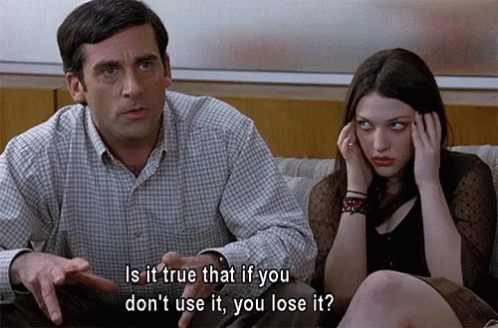by Colin Aina
Short answer...YES!! But by how much? Hmmmm.
I recently gave a talk for a company on the benefits of exercise and how to implement ways to add more activity to your day. We are always preaching the benefits of exercise and the horrible things that happen when we don't partake. But, what happens when we stop working out? I repeatedly hear grumbling from people who take time off and remark how bad they feel upon return, " Wow…you lose so much when you go away"! Yes, yes you do. But to what extent? Is it just that all-too-familiar feeling of diminished lung capacity? Does it go farther than that? How easily reversible are these deconditioning effects?
This first thing I notice is grumpiness. I assume you just nodded your head yes(?)! Active people all have something in common; they exercise because they have to…not so much because they need to. I can speak for myself and many other "Type A leaning" individuals that when we don't move, our mental state degrades. I like to call it an endorphin relapse (feel free to share that term with your friends). Think about people that you know who don't exercise, and maybe the reason why they are such a dick is because they never stimulate that all-too-important endorphin response! (Take that prick out for a walk!).
It has become pretty well known that exercise is great for relieving stress and fighting anxiety…but why? Michael Otto, Professor of Psychology at Boston University cites that exercise can stimulate your fight or flight mechanism. You know that feeling you get when you're about to get yelled at by your parents for not telling them that you just broke something in the house? Or the feeling that some people get when they see a brown male with a beard walking towards them on the street? That's our fight or flight response. So why do we want to stimulate it?? Well, exercising basically causes "stress" to the body. Muscle fibers need to be broken down and literally tear in order to get stronger and burn fat. Our heart needs to be worked to a challenging capacity in order to become more efficient, which increases our cardiac output and our ability to do more work over a sustained period of time. When we are exercising, we are experiencing these things in a positive way. When we stop exercising, our body starts to forget how to handle stress in such a way that when a stressful situation arises, anxiety is the the response to said stress.
Please take a watch of this video and listen to what Seth says about "prescribing" exercise. This is why I mountain bike…
I would argue that the above mental benefits are the most important reason to not stop exercising. Another outcome is elevated blood pressure. When we exercise, the arteries widen and circulation of blood flow becomes more "fluid". The stroke volume (amount of blood pumped per beat) increases. This benefit actually lingers for roughly 24hrs and then recedes back to baseline if the heart rate is not again elevated (via exercise). "Well Colin, what about the people that have high blood pressure due to genetics and just can’t seem to get it down"? Yes, genetics and diet will affect the effectiveness that exercise has upon improving blood pressure. I will also retort that it takes 90 days for positive results via training to improve your blood pressure. Are these people in question sticking to a consistent 3 month training routine with less than 2 days rest throughout as well as improving diet??
What else happens!?! Since you all read my last blog, you know what happens when you neglect your strength training sessions; loss of muscle mass which will slow down your metabolism, then leading to loss of bone density. Rather shockingly, muscle loss will start as soon as about 7 days with no strength-based training. This muscle loss will also have a much longer-term effect known as insulin resistance. When we are active, our muscles metabolize insulin, creating that needed by-product, glucose. This is what we use as energy. Less active bodies will start to adapt to the lack of energy expenditure (via exercise) by becoming resistant to insulin as a survival mechanism. The body will sense that we are not active and will then begin to convert that glucose into stored fat instead of readily-available energy. This fat will also begin to be stored more-so around the organs as visceral fat (ya know..the stuff that kills).
Lastly, the most noticeable adaptation to taking time off is that shortness of breath, labored breathing and tight chest...fun. Your Vo2 max begins to drop at a steady rate the longer you go without exercise. Without boring you to death, Vo2 max is the amount of oxygen that you can get into your system in order to do work…son! Everyone uses that oxygen at different efficiencies. In under 2 weeks without training, Vo2 drops 7 percent and close to 20 percent in just under 3 months. So, it pretty much takes 3 weeks of work for every week lost to regain where you were at. Keep in mind that the average gym goer will notice some lost "breath" when returning to their routine and won't really see the higher negative effects of lost VO2 unless they engage in some sort of maximum effort activity.
All of these losses are reversible with time and some return faster than others. Try not to get frustrated about feeling crappy when you return to your routine and know that you will regain your past tip-top fitness sooner than you think. I had to deal with this every season of my running career; the off season was the time to work on strength and establishing a baseline for the harder, more intense training to come in pre season....but the first few weeks of practice always sucked.
